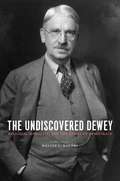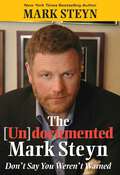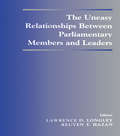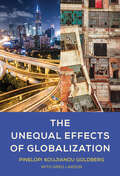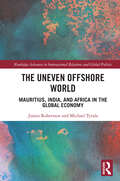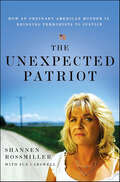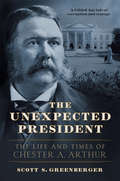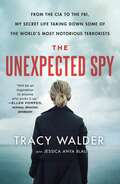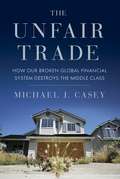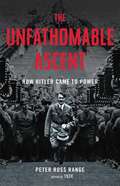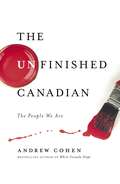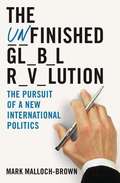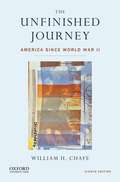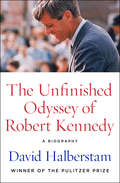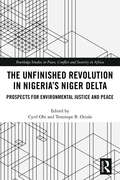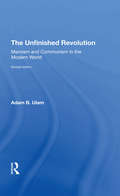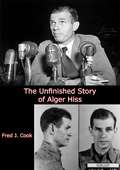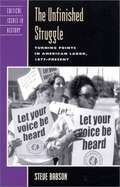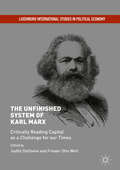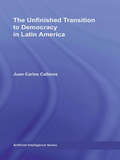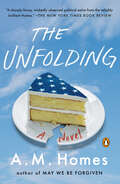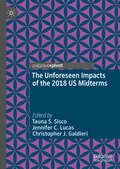- Table View
- List View
The Undiscovered Dewey: Religion, Morality, and the Ethos of Democracy
by Melvin RogersThe Undiscovered Dewey explores the profound influence of evolution and its corresponding ideas of contingency and uncertainty on John Dewey's philosophy of action, particularly its argument that inquiry proceeds from the uncertainty of human activity. Dewey separated the meaningfulness of inquiry from a larger metaphysical story concerning the certainty of human progress. He then connected this thread to the way in which our reflective capacities aid us in improving our lives. Dewey therefore launched a new understanding of the modern self that encouraged intervention in social and natural environments but which nonetheless demanded courage and humility because of the intimate relationship between action and uncertainty. Melvin L. Rogers explicitly connects Dewey's theory of inquiry to his religious, moral, and political philosophy. He argues that, contrary to common belief, Dewey sought a place for religious commitment within a democratic society sensitive to modern pluralism. Against those who regard Dewey as indifferent to moral conflict, Rogers points to Dewey's appreciation for the incommensurability of our ethical commitments. His deep respect for modern pluralism, argues Rogers, led Dewey to articulate a negotiation between experts and the public so that power did not lapse into domination. Exhibiting an abiding faith in the reflective and contestable character of inquiry, Dewey strongly engaged with the complexity of our religious, moral, and political lives.
The Undocumented Mark Steyn: Don't Say You Weren't Warned
by Mark SteynHe's brash, brilliant, and drawn to controversy like a moth to a flame. For decades, Mark Steyn has dazzled readers around the world with his raucous wit and brutal honesty. Whether he's sounding off on the tyranny of political correctness, the existential threat of Islamic extremism, the "nationalization" of the family, or the "near suicidal stupidity" of America's immigration regime, Steyn is always provocative-and often laugh-out-loud hilarious. The Undocumented Mark Steyn gathers Steyn's best columns in a timeless and indispensable guide to the end of the world as we know it.
The Uneasy Relationships Between Parliamentary Members and Leaders
by Lawrence D. Longley Reuven Y. HazanThe bases of uneasy member-leadership relations, their manifestation and sometimes resolution, and the consequences of member-leadership tension to effective parliamentary performace and policy-making are considered in studies ranging from Germany to the US and New Zealand and globally.
The Unequal Effects of Globalization (Ohlin Lectures)
by Pinelopi Koujianou GoldbergFrom a former Chief Economist of the World Bank, a brief, balanced, and sobering discussion of globalization trends, their drivers, and effects on inequality.The recent retreat from globalization has been triggered by a perception that increased competition from global trade is not fair and leads to increased inequality within countries. Is this phenomenon a small hiccup in the overall wave of globalization, or are we at the beginning of a new era of deglobalization? Former Chief Economist of the World Bank Group Pinelopi Koujianou Goldberg tells us that the answer depends on the policy choices we make, and in this book The Unequal Effects of Globalization, she calls for exploring alternative policy approaches including place-based policies, while sustaining international cooperation.At this critical moment of shifting attitudes toward globalization, The Unequal Effects of Globalization enters the debate while also taking a step back. Goldberg investigates globalization&’s many dimensions, disruptions, and complex interactions, from the late twentieth century&’s wave of trade liberalizations to the rise of China, the decline of manufacturing in advanced economies, and the recent effects of trade on global poverty, inequality, labor markets, and firm dynamics. From there, Goldberg explores the significance of the recent backlash against and potential retreat from globalization and considers the key policy implications of these trends and emerging dynamics.As comprehensive as it is well-balanced, The Unequal Effects of Globalization is an essential read on trade and cooperation between nations that will appeal as much to academics and policymakers as it will to general readers who are interested in learning more about this timely subject.
The Uneven Offshore World: Mauritius, India, and Africa in the Global Economy (Routledge Advances in International Relations and Global Politics)
by Justin Robertson Michael TyralaInformed by world-systems analysis, this book examines the shifting patterns of accommodation and resistance to the offshore world, with a particular focus on Mauritius as a critical but underappreciated offshore node mediating foreign investment into India and Africa. Drawing on a large pool of financial data and elite interviews, the authors present the first detailed comparative study of the Mauritius–India and Mauritius–Africa offshore relationships. These relationships serve as indicative test cases of the contemporary global tax reform agenda and its promise to rein in offshore finance. Whereas India’s economic power and multilateral track record have enabled it to actively shape this agenda and implement it in a robust manner, most African countries have found themselves either unable to meet its stringent criteria or unwilling to do so out of fear that it might discourage investment. Its impact on offshore financial centers has likewise been limited. A few of the least sophisticated ones appear to have fallen by the wayside, but the rest have either remained largely unaffected, or, like Mauritius, succeeded in consolidating their operations and surviving the current round of regulatory headwinds. The findings suggest that the contemporary global tax reform agenda has thus far not only failed to make good on its promise but also actually reinforced numerous existing power hierarchies. The Uneven Offshore World is written in an accessible style and aimed at readers without specialized knowledge of tax issues.
The Unexpected Patriot: How an Ordinary American Mother Is Bringing Terrorists to Justice
by Sue Carswell Shannen RossmillerAfter 9/11, when the nation was still in shock over the unprecedented attack on U.S. soil, Shannen Rossmiller, a country judge and mother of three in rural Montana, was formulating a plan. Soon she was devouring literature on Islamic culture, teaching herself Arabic, and preparing to infiltrate the central nervous system of global terror: online networks. Her efforts succeeded beyond imagination. Posing as an Islamic terrorist under dozens of screen aliases, she joined forces with the FBI and started trolling jihadist chat rooms, striking up conversations at 3am with men as far away as Pakistan, and amassing evidence against an array of suspected terrorists both at home and abroad. Her work laid the foundation for the online searches so crucial to law enforcement's fight against terror today. Shannen's husband, Randy, uncovered her double life after a chat room terrorist wiped out the family computer and reports rolled in that the Rossmillers were being targeted for reprisal. Undeterred, Shannen started working with the FBI on sting operations, involving everything from jihadist cells to weapons caches to bomb plots, and bringing many of her targets to justice, as well as pioneering the digital entrapment tactics that are at the forefront of today's war on terror. This is the story of one woman's unexpected courage and how it changed the face of this global struggle.
The Unexpected President: The Life and Times of Chester A. Arthur
by Scott S. GreenbergerNobody expected the vice president, a New York political hack, to be president. And after President James A. Garfield was shot in 1881, nobody expected Chester A. Arthur to become a strong and effective president, a courageous anti-corruption reformer, and an early civil rights advocate. And yet...Despite his promising start as a young man, by his early fifties Chester A. Arthur was known as the crooked crony of New York machine boss Roscoe Conkling. For years Arthur had been perceived as unfit to govern, not only by critics and the vast majority of his fellow citizens but by his own conscience. As President James A. Garfield struggled for his life, Arthur knew better than his detractors that he failed to meet the high standard a president must uphold.And yet, from the moment President Arthur took office, he proved to be not just honest but brave, going up against the very forces that had controlled him for decades. He surprised everyone--and gained many enemies--when he swept house and took on corruption, civil rights for blacks, and issues of land for Native Americans.A mysterious young woman deserves much of the credit for Arthur's remarkable transformation. Julia Sand, a bedridden New Yorker, wrote Arthur nearly two dozen letters urging him to put country over party, to find "the spark of true nobility" that lay within him. At a time when women were barred from political life, Sand's letters inspired Arthur to transcend his checkered past--and changed the course of American history.This beautifully written biography tells the dramatic, untold story of a virtually forgotten American president. It is the tale of a machine politician and man-about-town in Gilded Age New York who stumbled into the highest office in the land, only to rediscover his better self when his nation needed him.
The Unexpected Scalia
by David M. DorsenAntonin Scalia was one of the most important, outspoken, and controversial Justices in the past century. His endorsements of originalism, which requires deciding cases as they would have been decided in 1789, and textualism, which limits judges in what they could consider in interpreting text, caused major changes in the way the Supreme Court decides cases. He was a leader in opposing abortion, the right to die, affirmative action, and mandated equality for gays and lesbians, and was for virtually untrammelled gun rights, political expenditures, and the imposition of the death penalty. However, he usually followed where his doctrine would take him, leading him to write many liberal opinions. A close friend of Scalia, David Dorsen explains the flawed judicial philosophy of one of the most important Supreme Court Justices of the past century.
The Unexpected Spy: From the CIA to the FBI, My Secret Life Taking Down Some of the World's Most Notorious Terrorists
by Jessica Anya Blau Tracy WalderA highly entertaining account of a young woman who went straight from her college sorority to the CIA, where she hunted terrorists and WMDs"A thrilling tale...Walder’s fast-paced and intense narrative opens a window into life in two of America’s major intelligence agencies" —Publishers Weekly (starred review)When Tracy Walder enrolled at the University of Southern California, she never thought that one day she would offer her pink beanbag chair in the Delta Gamma house to a CIA recruiter, or that she’d fly to the Middle East under an alias identity.The Unexpected Spy is the riveting story of Walder's tenure in the CIA and, later, the FBI. In high-security, steel-walled rooms in Virginia, Walder watched al-Qaeda members with drones as President Bush looked over her shoulder and CIA Director George Tenet brought her donuts. She tracked chemical terrorists and searched the world for Weapons of Mass Destruction. She created a chemical terror chart that someone in the White House altered to convey information she did not have or believe, leading to the Iraq invasion. Driven to stop terrorism, Walder debriefed terrorists—men who swore they’d never speak to a woman—until they gave her leads. She followed trails through North Africa, Europe, and the Middle East, shutting down multiple chemical attacks.Then Walder moved to the FBI, where she worked in counterintelligence. In a single year, she helped take down one of the most notorious foreign spies ever caught on American soil. Catching the bad guys wasn’t a problem in the FBI, but rampant sexism was. Walder left the FBI to teach young women, encouraging them to find a place in the FBI, CIA, State Department or the Senate—and thus change the world.
The Unfair Trade: How Our Broken Global Financial System Destroys the Middle Class
by Michael J. CaseyA wake-up call for middle class Americans who feel trapped in a post-crisis economic slump, The Unfair Trade is a riveting exposé of the vast global financial system whose flaws are the source of our economic malaise. Our livelihoods are now, more than ever, beholden to the workings of its imbalances and inequities. The trillions of dollars that make up the flow of international finance--money that is often steered away from the people who deserve it the most--have not just undermined the lives of working and middle class Americans. It is a world-wide phenomenon that is changing the culture of Argentina; destroying the factory system in Northern Mexico, enabling drug cartels to recruit thousands of young men into their gangs; that has taken down the economies of Iceland, Ireland, Spain, Greece, and possibly Italy; and is driving American companies such as a 60-year-old family owned manufacturer of printed circuit boards to shutter all but one of its factories. Veteran journalist Michael Casey has traveled the world--from China to Iceland, Spain to Argentina, Indonesia to Australia--recounting extraordinary stories about ordinary people from one continent to another whose lives are inextricably linked. By tracing the flow of money and goods across the world, he illustrates how an American homeowner's life is shaped by the same economic and social policies that determine those of a low wage migrant worker on an assembly line in China. This combination of financial acumen, narrative-driven reporting, and compelling story-telling gives The Unfair Trade a unique human angle. Casey shows that our economic problems are largely caused by political agendas that prevent the free market from encouraging fair competition and impeding the allocation of resources. Until governments work together to make this global system more efficient--until China removes incentives for its citizens to save excessively, for example, or the U.S. ends the de facto subsidies enjoyed by politically powerful banks--the global playing field will remain lopsided, job creation will lag, and our economies will be vulnerable to new crises.
The Unfathomable Ascent: How Hitler Came to Power
by Peter Ross RangeThe chilling and little-known story of Adolf Hitler's eight-year march to the pinnacle of German politics.On the night of January 30, 1933, Adolf Hitler leaned out of a spotlit window of the Reich chancellery in Berlin, bursting with joy. The moment seemed unbelievable, even to Hitler. After an improbable political journey that came close to faltering on many occasions, his march to power had finally succeeded.While the path of Hitler's rise has been told in books covering larger portions of his life, no previous work has focused solely on his eight-year climb to rule: 1925-1933. Renowned author Peter Ross Range brings this period back to startling life with a narrative history that describes brushes with power, quests for revenge, nonstop electioneering, American-style campaign tactics, and-for Hitler-moments of gloating triumph followed by abject humiliation.Indeed, this is the tale of a high-school dropout's climb from the infamy of a failed coup to the highest office in Europe's largest country. It is a saga of personal growth and lavish living, a melodrama rife with love affairs and even suicide attempts. But it is also the definitive account of Hitler's unrelenting struggle for control over his raucous movement, as he fought off challenges, built and bullied coalitions, quelled internecine feuds and neutralized his enemies-all culminating in the creation of the Third Reich and the western world's descent into darkness. One of the most dramatic and important stories in world history, Hitler's ascent spans Germany's wobbly recovery from World War I through years of growing prosperity and, finally, into crippling depression.
The Unfinished Canadian: The People We Are
by Andrew CohenThe award-winning, bestselling author of While Canada Slept gives his view of a country wasted on Canadians. What is national character? What makes the Americans, the British, the French, the Russians, and the Chinese who they are? In this homogenized world, where globalization is a byword for a deadening sameness, why do peoples who live in the same region, use the same money, read the same books, and watch the same movies remain different from one another? As much as Canada may be seen as a copy, clone, or colony of America, we are unquestionably distinctive. It is a result of our geography, history, and politics. It comes from our demography and prosperity. Most of all, it comes from our character. In The Unfinished Canadian, Andrew Cohen delves into our past and present in search of our defining national characteristics. He questions hoary shibboleths, soothing mythologies, and old saws with irreverence, humour, and flintiness, unencumbered by our proverbial politeness (itself a great misperception) and our suffocating political correctness. We are so much, in so many shades, and it's time we took an honest look at ourselves. In this provocative, passionate, and elegant book, Cohen argues that our mythology, our jealousy, our complacency, our apathy, our amnesia, and our moderation are all part of the unbearable lightness of being Canadian.From the Hardcover edition.
The Unfinished Global Revolution
by Mark Malloch-BrownAn incomparable public servant and internationalist offers a new vision for international cooperation. In The Unfinished Global Revolution, former United Nations deputy secretary general Mark Malloch- Brown diagnoses the central global predicament of the twenty-first century-as we have become more integrated, we have also become less governed. National governments are no longer equipped to address complex global issues, from climate change to poverty, and international organizations have not yet been empowered to step into the breach. In this book, Malloch- Brown wrenches the discussion away from terrorism, nationalism, and Iraq and calls for a new global politics-a bigger league, with greater opportunity for all. Beneath a spotlight rarely reserved for public servants, Malloch-Brown has been at the center of recent world events: at the World Bank, when it was under siege from activists; and at the UN, where he fought off conservative critics who first attacked its role in development and then turned on Kofi Annan after the Iraq war. In The Unfinished Global Revolution, he draws on his experiences at the front lines of international development over the past several decades-from Cambodia to Darfur, and from Washington to UN headquarters-in order to provide a personal, on-the-ground view of seemingly abstract challenges. The Unfinished Global Revolution chronicles how over the past few decades domestic problems- from unemployment to environmental distress- increasingly have international roots. As national politicians lose control to impersonal global forces, they will be forced to become more effective participants in international mechanisms, such as the United Nations, that may offer the only viable solutions. Increasingly, ad hoc arrangements among NGOs, civil society, and the private sector are filling in the gap created by the failures of individual governments. In the wake of the worldwide economic crisis of 2008, many have been forced to acknowledge that a global economy needs global institutions to govern it. What is true for finance, Malloch- Brown argues, is surely true for public health, poverty, or climate change. In The Unfinished Global Revolution, he calls for us to embrace more powerful international institutions and the values needed to underpin a truly globalist agenda-the rule of law, human rights, and opportunity for all. .
The Unfinished Journey: America Since World War II
by William H. ChafeBrilliantly written by a prize-winning historian, The Unfinished Journey, Eighth Edition, considers both the paradoxes and the possibilities of postwar America. William H. Chafe portrays the significant cultural and political themes that have colored our country's past and present, including issues of race, class, gender, foreign policy, and economic and social reform. He examines such subjects as the Vietnam War, the civil rights movement, the origins and the end of the Cold War, the culture of the 1970s, the rise of the New Right, the events of September 11th and their aftermath, and various presidencies.
The Unfinished Odyssey of Robert Kennedy: A Biography
by David Halberstam&“Far and away the best book written about Senator Kennedy&” from the Pulitzer Prize–winning journalist and bestselling author (The New York Times). Structured around the 1968 Democratic presidential campaign, The Unfinished Odyssey of Robert Kennedy offers an in-depth exploration of Robert Kennedy, both as a man and a politician. Kennedy&’s mass appeal to minority groups, his antiwar stance, and his support from Catholics made him unlike any other politician of his stature in the late 1960s. Acclaimed journalist David Halberstam dives into Kennedy&’s career, covering his work as US attorney general and campaign manager for his brother John, his run for a New York state senate seat, and his candidacy in the 1968 Democratic presidential primary. Through this crucial period, he charts Kennedy&’s evolution as one of the nation&’s most clear-headed progressives, ultimately revealing a man who—even now—personifies the shift toward a more equal America. This ebook features an illustrated biography of David Halberstam including rare images from the author&’s estate.
The Unfinished Odyssey of Robert Kennedy: A Biography
by David Halberstam&“Far and away the best book written about Senator Kennedy&” from the Pulitzer Prize–winning journalist and bestselling author (The New York Times). Structured around the 1968 Democratic presidential campaign, The Unfinished Odyssey of Robert Kennedy offers an in-depth exploration of Robert Kennedy, both as a man and a politician. Kennedy&’s mass appeal to minority groups, his antiwar stance, and his support from Catholics made him unlike any other politician of his stature in the late 1960s. Acclaimed journalist David Halberstam dives into Kennedy&’s career, covering his work as US attorney general and campaign manager for his brother John, his run for a New York state senate seat, and his candidacy in the 1968 Democratic presidential primary. Through this crucial period, he charts Kennedy&’s evolution as one of the nation&’s most clear-headed progressives, ultimately revealing a man who—even now—personifies the shift toward a more equal America. This ebook features an illustrated biography of David Halberstam including rare images from the author&’s estate.
The Unfinished Peace after World War I
by Patrick O. CohrsThis is a highly original and revisionist analysis of British and American efforts to forge a stable Euro-Atlantic peace order between 1919 and the rise of Hitler. Patrick Cohrs argues that this order was not founded at Versailles but rather through the first 'real' peace settlements after World War I - the London reparations settlement of 1924 and the Locarno security pact of 1925. Crucially, both fostered Germany's integration into a fledgling transatlantic peace system, thus laying the only realistic foundations for European stability. What proved decisive was that key decision-makers drew lessons from the 'Great War' and Versailles' shortcomings. Yet Cohrs also re-appraises why they could not sustain the new order, master its gravest crisis - the Great Depression - and prevent Nazism's onslaught. Despite this ultimate failure, he concludes that the 'unfinished peace' of the 1920s prefigured the terms on which a more durable peace could be founded after 1945.
The Unfinished Revolution in Nigeria’s Niger Delta: Prospects for Environmental Justice and Peace (Routledge Studies in Peace, Conflict and Security in Africa)
by Cyril Obi Temitope B. OriolaThe 1990s heralded waves of spectacular forms of local resistance and globalized protest against oil exploitation and environmental pollution in oil-producing regions of the developing world. One of the most spectacular local uprisings against global oil multinationals was led by the Ogoni people who were protesting against the exploitation and marginalization of oil-producing ethnic minority communities in the Niger Delta region of Nigeria. However, the hanging on November 10, 1995 of nine Ogoni ethnic minority and environmental justice activists, including Ken Saro-Wiwa, only served to exacerbate protests in later years. Within a decade, dozens of locally rooted insurgent groups emerged in the Niger Delta and construed themselves as part of the social movement for ethnic minority rights and environmental justice which dates back to colonial times. However, the trajectory of the revolutionary momentum has changed over time, reflecting a mix of progressive, opportunistic and retrogressive trends. This book provides a critical study of the trajectory of struggles in the Niger Delta since 1995, paying attention to continuities and changes, including recent developments linked to the shift from local resistance, to the rupturing of the Presidential Amnesty peace deal (largely to the Movement for the Emancipation of the Niger Delta) and the resurgence low-intensity sporadic armed militancy—led by the Niger Delta Avengers militia among others. The contributors critically interrogate the nature of the region’s political economy, socio-economic trends and trajectories over the past two decades. This collection also accentuates the lessons learnt, prospects for self-determination, socio-economic and environmental justice and peace in the aftermath of the hanging.
The Unfinished Revolution: Marxism And Communism In The Modern World --revised Edition
by Adam B UlamMarxism has been the most pervasive and widespread ideological phenomenon of our times, but seldom, if ever, has it been found in its form. Whenever the Marxist ideology has been historically significant, it has been so as a beneficiary and associate of another set of political beliefs and passions. As a contender for power it seeks to express the dreams and yearnings of societies caught in the painful process of modernization and industrialization. In power it tends to pay lip service to its lofty goals, but associates them with old-fashioned nationalism. Practice does not reflect theory. Ruling elites and parties surpass traditional capitalism in their dedication to political centralization and industrialism at all costs. This revised edition of Adam Ulam's standard work retains the author's summary and critique of Marx's historical, economic, and political arguments. Ulam then examines the relationship of Marxism to other schools of contemporary socialism and to other radical and revolutionary theories. He traces the development of Marxian thought, explains why it has been the potent force in certain societies–while in other societies its influence has been insignificant–and analyzes how Marxism and Leninism have affected the shaping of Russian Communism. Finally Ulam looks at Marxism in the future: the role it will play in the development of the Soviet Union, and how it will affect the contemporary crisis of liberal institutions in the West.
The Unfinished Story of Alger Hiss
by Fred J. CookA very interesting investigation authored by a 1950s-era journalist attempting to demonstrate the innocence of Alger Hiss - a former important US State Department official who was accused of communist subversion and espionage on behalf of the Soviet Union. Author insists that the case against Hiss was never adequately proven and that insufficient documentation and testimony was brought forth during the Hiss hearings. Book raises important questions about the flawed nature and questionable proceedings of American justice.-Print ed.
The Unfinished Struggle: Turning Points in American Labor, 1877-present
by Steve BabsonThe Unfinished Struggle is one of the most concise, comprehensive, and accessible history of the modern American labor movement ever written. Labor scholar and activist Steve Babson's dramatic narrative examines the numerous attempts to organize workers from the Great Uprising of 1877 to the sitdown strikes of the 1930s to the present day. Babson illuminates the tumultuous past, evolving agenda, and continuing conflicts of the labor movement. He carefully identifies the causes of labor's decline in recent decades and explains union leaders' attempts to revive their organizations. Most important, Babson shows readers how the fortunes of organized labor are tied to larger trends in American history.
The Unfinished System of Karl Marx: Critically Reading Capital As A Challenge For Our Times (Luxemburg International Studies In Political Economy Ser.)
by Judith Dellheim Frieder Otto WolfThis book examines what we can gain from a critical reading of Marx's final manuscript and his conclusion of the "systematic presentation" of his critique, which was the basis for Engels's construction of the third volume of his infamous 'Capital'. The text introduces the reader to a key problem´of Marx's largely implicit epistemology, by exploring the systematic character of his exposition and the difference of this kind of 'systematicity' from Hegelian philosophical system construction. The volume contributes to establishing a new understanding of the critique of political economy, as it has been articulated in various debates since the 1960s - especially in France, Germany, and Italy - and as it had already been initiated by Marx and some of his followers, with Rosa Luxemburg in a key role. All the chapters are transdisciplinary in nature, and explore the modern day relevance of Marx's and Luxemburg's theoretical analysis of the dominance of the capitalist mode of production.
The Unfinished Transition to Democracy in Latin America
by Juan Carlos Calleros-AlarcónThis book examines the political evolution of the judiciary – a usually overlooked political actor – and its capacity to contribute to the process of democratic consolidation in Latin America during the 1990s. Calleros analyzes twelve countries in order to assess the independence, impartiality, political strength and efficiency of the judicial branch. The picture that emerges – with the one exception of Costa Rica – is the persistence of weak judicial systems, unable in practice to check other branches of government, including the executive and the military, while not quite effective in fully protecting human rights or in implementing due process of law guarantees. Aggravating issues, such as corruption, heavy case backlogs, overcrowding of prisons, circumvention of laws and personal vulnerability of judges, make the judiciary the least evolved of the three branches of government in the Latin American transitions to democracy.
The Unfolding: A Novel
by A.M. Homes"A dazzling portrait of a family—and a country—in flux…The Unfolding is hilarious and shocking and heartbreaking and just a little bit deranged—in other words, it&’s a book that feels like what it feels like to be alive right now." --Nathan Hill, author of The Nix &“Gripping, sad, funny, by turns aching and antic and, as always, exceedingly well-observed and -written.&”--Michael Chabon, bestselling and Pulitzer Prize-winning author of Moonglow and The Amazing Adventures of Kavalier & Clay In her first novel since the Women&’s Prize award-winning May We Be Forgiven, A.M. Homes delivers us back to ourselves in this stunning alternative history that is both terrifyingly prescient, deeply tender and devastatingly funny.The Big Guy loves his family, money and country. Undone by the results of the 2008 presidential election, he taps a group of like-minded men to reclaim their version of the American Dream. As they build a scheme to disturb and disrupt, the Big Guy also faces turbulence within his family. His wife, Charlotte, grieves a life not lived, while his 18-year-old daughter, Meghan, begins to realize that her favorite subject—history—is not exactly what her father taught her. In a story that is as much about the dynamics within a family as it is about the desire for those in power to remain in power, Homes presciently unpacks a dangerous rift in American identity, prompting a reconsideration of the definition of truth, freedom and democracy—and exploring the explosive consequences of what happens when the same words mean such different things to people living together under one roof.From the writer who is always &“razor sharp and furiously good&” (Zadie Smith), a darkly comic political parable braided with a Bildungsroman that takes us inside the heart of a divided country.
The Unforeseen Impacts of the 2018 US Midterms
by Christopher J. Galdieri Jennifer C. Lucas Tauna S. SiscoThis book explores multiple stories of the 2018 US midterm elections. From retirements and redistricting, to #MeToo and tariffs, it synthesizes the consequences through a thoughtful, empirical analysis. As the final votes are counted, we scholars know that midterm elections matter and have unforeseen consequences for decades to come.
